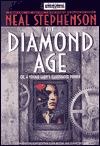
 The CBC has just made a series of samples avaiable that will be sure whet your appetite for the proposed CBC Radio One series FASTER THAN LIGHT! Spanning the years 1978-1998 these samples of previous Science Fiction, Fantasy and Horror stories illustrate what is possible on radio. Enjoy!
The CBC has just made a series of samples avaiable that will be sure whet your appetite for the proposed CBC Radio One series FASTER THAN LIGHT! Spanning the years 1978-1998 these samples of previous Science Fiction, Fantasy and Horror stories illustrate what is possible on radio. Enjoy!
Nightfall: “Safe in the Arms of Jesus” (1983)
One of the most disturbing radio series ever produced. The show ignited complaints from many listeners that it was too frightening, prompting some stations to drop the series from their programming.
99 half-hour episodes (1980 to 1983) – Listen to Real Audio clip
Vanishing Point: “The Man Who Dreamed in Djemma El Fna” (1991)
This series specialized in experimental dramas in the genres of sci-fi, supernatural, classics, pro-environment, and spiritual journeys. Its defining characteristic is extensive “on location” sound effects, with about half the performances done in a whisper. About half the shows are done in a familiar, straight-forward, manner and the other half are dreamy psychological journeys. The series incorporated several ‘sub-series’ over the course of its long run.
205 half-hour episodes (1984 to 1991) – Listen to Real Audio clip
Alice in Cyberspace: episode 1 – “Down the Data Stream”
Twelve-year old Alice and her adventures beyond the computer monitor as she meets the White Rabbit, the Music Master, and her PET (Personal Electronics Telecommunicator). Late one night, the White Rabbit shows up on Alice’s computer as a screen saver. Next thing Alice knows, she’s tumbling down the data stream. Alice’s knowledge of history, geography, math, science, the arts and good old-fashioned common sense are put to the test. For children ages 8 and up.
Fifteen 11-minute episodes – Listen to Real Audio clip
The Skid, episode 6
John Raven, former God of Chariot Drivers and erstwhile lesser deity, is back for one last kick at the terrestrial can. In this six-part series from writer Thomas Lackey, Raven is dispatched from Heaven by his reluctant colleague The Controller to avert a Millennial disaster. It seems that downsizing fever has hit the Celestial Spheres, and since soul revenue from Earth is way down, the powers Up the Mountain are considering terminating the whole terrestrial operation as unprofitable. Raven and the Controller, fearing for their own jobs, hit upon a scheme to avert catastrophe by performing a few modest miracles for select individuals. True to form, Raven botches the job and the fun begins.
6 half-hour episodes (1998) – Listen to Real Audio clip
Johnny Chase, Secret Agent of Space: episode 2
This over-the-top sci-fi series features misfit secret agent, Johnny Chase, who confronts the various threats to our expansion through the spaceways, and is set in a future in which mankind has expanded it’s empire to 200 light years across. The first season consisted of stand-alone anthology stories. The second season was a 26-part serial that was one long 26-part story, during which the Earth’s sun gets destroyed and the remnants of humanity, aboard a rag-tag assortment of spaceships, search for a new home. The series is part spoof, part serious space opera, with rocket ships, ray guns, clones, and space battles, and sprinklings of sorcery, mysticism, and even Dracula.
Approximately 79 half-hour episodes (1978 to 1979, 1981) – Listen to Real Audio clip
The Arabian Nights: Part 1
Terrible djinnis and subtle sorcerers, wretched fisherman and haughty emperors whirl through this fantastical dramatization of the famous, magical tales of the Arabian Nights. Stories spirl into other stories in a rich weave: parables rub alongside bawdy jokes, fantasies merge into hair-raising adventures, and plots of intricate revenge meet melodies of unlikely love. The transformations are created by an astonishing collection of actors.
8 half-hour episodes (1993) – Listen to Real Audio clip
Posted by Jesse Willis

 Check out this great 10 minute long documentary on Science Fiction and SF fandom done by Joe Mahoney for broadcast on CBC Radio One‘s The Current. Authors interviewed include: John Scalzi, Cory Doctorow, John Clute, Robert J. Sawyer, and Margaret Atwood.
Check out this great 10 minute long documentary on Science Fiction and SF fandom done by Joe Mahoney for broadcast on CBC Radio One‘s The Current. Authors interviewed include: John Scalzi, Cory Doctorow, John Clute, Robert J. Sawyer, and Margaret Atwood.![]()



 Ender’s Game
Ender’s Game The Diamond Age: Or, a Young Lady’s Illustrated Primer
The Diamond Age: Or, a Young Lady’s Illustrated Primer